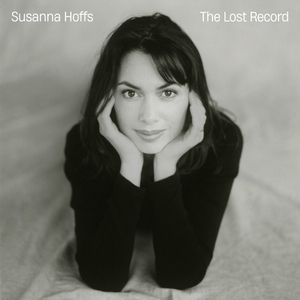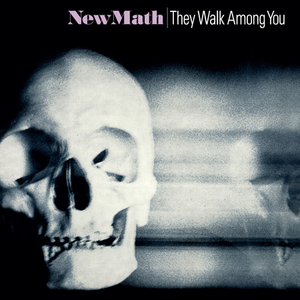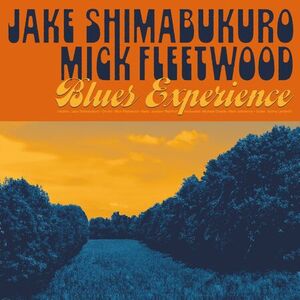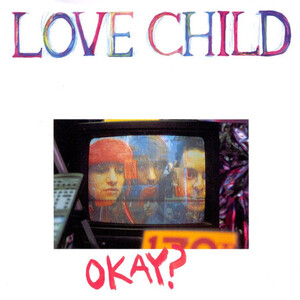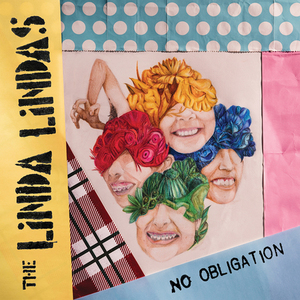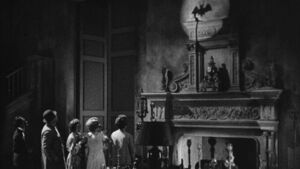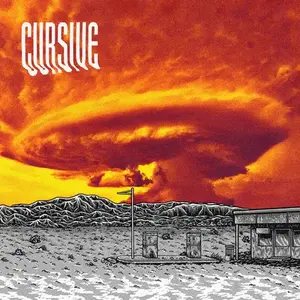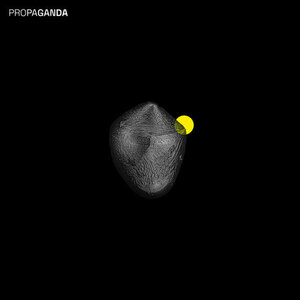Ashes To Ashes: An Interview with
Peter Murphy
Steve Stav
“murphy”
By combining elements of David Bowie, T. Rex, and Bram Stoker with an piercing ferocity that was often mistaken for punk anger, Bauhaus created a new music genre – “gothic rock” – almost single-handedly in the free-for-all early 1980s. Prowling the stage like a nocturnal predator, frontman Peter Murphy presented a startling image – the persona of a vampirish pied piper, a mesmerist, a musical master of the macabre. That image was furthered to the point of cult-immortalization when a demon-like, caged Murphy sang Bauhaus’ biggest hit, “Bela Lugosi’s Dead,” in The Hunger’s unforgettable opening sequence. Though that Gothic image should be as dead-and-buried (except for a reunion tour) as Mr. Lugosi himself, many in the media – and a good portion of Murphy’s fans – cling to that colorless persona with a death-grip. Twenty years after the fact, it still makes for vivid copy, and for great fashion noir. Though his solo catalogue and live performances barely suggest a connection to his shadow-casting Bauhaus past, Murphy remains a bit of a mystery – and he possesses a certain duality that only enhances his mystique. An intellectual aristocrat of working-class Irish lineage, Murphy, onstage, is arrogant and full of rock-star posture… and privately, he’s an extremely gracious and soft-spoken family man. One might surmise that the rock icon has done a precarious balancing act with these conflicting personalities – and the struggles with self-confidence that go with the territory – throughout his long career. Like his hero-peers Bryan Ferry, Ryuichi Sakamoto, and Bowie, Peter Murphy is primarily driven by an endless search for musical perfection, for the elusive butterfly of sonic beauty that occasionally flutters by in a blur. And like those aforementioned, Murphy is handier with a net than most.
His latest vision of beauty, Dust (Metropolis Records), is an eyebrow-raising album that is confusing some of his devotees – and intoxicating others. Hinted at during Murphy’s milestone “Alive Just For Love” tour last year (captured on disc of same title), Dust seamlessly weaves traditional Eastern influences with Western electronica and alt-rock – with Murphy’s omnipresent voice sharing the spotlight with exotic instruments as tambla, banjitar, and infinite guitar. The incredibly compelling record is the result of a chance meeting and subsequent collaboration with Turkish-born, Montreal-residing composer/producer Mercan Dede; perhaps because it’s the only disc that remotely resembles it, Dust is being compared to Peter Gabriel’s Passion. Now halfway through his forties, the gaunt, frightfully limber-limbed singer is at a crossroads. Perhaps this record marks a completely new beginning; perhaps it’s merely a reflection of a slightly re-defined, complex artist. One could compare Murphy’s soul-baring “Alive” performance to an ever-evolving musician emerging from a chrysalis, and now, with Dust, taking flight like the monarch of his dreams.
Conducting a “Q&A” style interview is not an easy task. With one eye on the clock, you have to engage the subject in conversation and be able to formulate new questions based upon their answers. You need to do extensive homework; in case the artist goes off on an unexpected tangent, you need to be skilled at steering him back to your line of questioning with some degree of subtlety. When this particular artist rang me up prior to a May 13 soundcheck in Minneapolis, I was soon to discover two things – one, there’s no sense in going toe-to-toe with the Dark Prince; and two, there’s no “steering” Peter Murphy.
• •
First of all, I want to complement you on your marvelous new record…
Well, if you mean that, I mean it too – thanks.
Of course I mean it. Apart from being a supposedly impartial rock critic, I’ve been listening to your albums for twenty years.
Then you’d be able to be a good judge (of the CD), because you’ve got the baggage of what I’ve made in the past.
I wouldn’t call it baggage… though, I will admit, if I hadn’t heard you perform some of this material last year, I would have been more surprised. I’m going to guess that this is an album that you’ve been wanting to make for a long time.
No… to be really honest with you, people have asked me, especially in Turkey – “Why don’t you do this, why don’t you make (your music) more Turkish?” I said, “Nahh… that’s rubbish. I’m not going to make a ‘world’ album. That’s bullshit, that’s not at all what I’m about – I’m not a ‘world’ artist.” But then, I met Mercan (Dede) and heard his album; I thought, “Oh, fuck, it works!” See, I didn’t want (Dust) to sound like a Peter Gabriel album.
Not knocking Peter Gabriel…
Not knocking Peter Gabriel at all. C’mon, Passion is an amazing album. It’s more of an academic thing, really. [The new CD] would have to have the originality, the “unfathomable-ness” of Peter Murphy and Bauhaus and all that stuff… when I heard Mercan’s album, which is much more of a Sufi [essentially Turkish sacred music] album using Western sort of ideas, I thought, “Ahh, OK, I can make this [record].” Actually, I performed impromptu with his Sufi outfit-ensemble, which included Hugh Marsh on electric violin and Shankar on tabla. I thought, “My God, the instruments are so powerful.” It was then I could hear and understand how it could work. There is a right time for everything. Actually, I want to add something. A lot of people are calling this a “departure.” I checked Amazon.com yesterday – the reviews – and some of the American kids are really pissed off at me [laughs]. [Adopting a funny American accent] “Peter Murphy, where is he? My God, this is just drivel, with no vocals!” There’s loads of vocals – it’s amazing. Get real, wake up, smell the coffee, drop the past, it’s a fantastic album, shut up [laughs]. There has been a really amazing, good reaction to it. What I don’t expect is the Grammy that I think this album should get – only because the Grammys are about Hollywood, about marketing, who knows. If this doesn’t get a Grammy, it’s OK, but it bloody well should. What did you ask me? I’ve forgotten what you’ve asked me [laughs].
The “Peter Murphy Rant”…
No, I’m only covering everything in one answer, it’s a technique.
You’ve lived in Turkey for ten years, but it takes meeting a Turkish man in Canada for…
Well, that is what we call in Turkey “kismet” – I think that word is still used in Western language sometimes. It means “a pre-destined meeting earned through good works.” If you make the right turn on a road, you get to a nice place, do you know what I mean? I think both of us had been working and earning the right and pleasure of working with one another.
Your last tour was a departure for you, being “stripped down” and closer to the audience. I remember talking to you about how that was an experiment, and you were a bit apprehensive…
Did we talk during the tour, or after (Alive Just For Love’s) release?
It was a week or so into the tour.
Right, when it was verrry difficult, psychologically. Consciously, I was aware that that was going to happen – that was one of the reasons why I wanted to do it. On a very personal level, I wanted to take my makeup off, and walk up to a fan – metaphorically – in their front room, start singing, and see if there was Peter Murphy left in there, still. I wasn’t sure about it during the tour, but once we mixed the album and I heard the playback, man, I thought it was really successful. I was surprised as anybody, and that was the beauty of it.
At the time, I think I wrote that it was “one of the most stunning vocal performances that I’ve witnessed.”
Thanks. At the time, it was kind of like… people say “you’re so beautiful,” and you look in the mirror and say, “I don’t see that. Are they right, or not?” I just see my pimples and my big nose and the stains on my teeth. Actually, it’s just a case of loving yourself in a way that’s not based on egocentricity.
So, what did you learn about yourself?
That I was all that I hoped I would be, as an artist. But only after I’d mixed [the CD].
You’ve got a brand new band…
This is the best band… you’ve got to hear them play, it’s something else.
On this tour, are you going to reinterpret some of your other songs in an Eastern vein?
I’m not telling you, but the show is generally going to leave you with your jaw in your hands, I think.
Even more so than last year?
Yep.
Why did you choose to rerecord “My Last Two Weeks” and “Subway”?
Because Mercan insisted on it. When I mixed the album [Alive Just For Love] in Montreal – where Mercan lives – I invited him to listen to the playback, to get him accustomed to my music. The next album, which turned out to be Dust, was going to be centered around what Peter Murphy is, which is a “vocal performance.” Before I had given him my albums, he wasn’t really aware of Bauhaus or myself. [Alive Just For Love] blew him away, and he insisted that we do “Two Weeks” and “Subway.” I said, “I’ve released ‘Subway’ twice already.” He said, “No, no, no… you don’t understand. Your music is ultimately vocals and lyrics and melodies that are classics, they can be reworked in any way.” I was a little bit wary of that – I didn’t want to appear to be selling the audience cheap. But I said alright, sure, but I would have the last word on them. For my part, I insisted upon adding the epilogue verse to “Subway.” They turned out to work completely as new pieces of music.
When you were recording this, you had to have known that some of your “gothic” fans, the fans of the “Bela Lugosi’s Dead” era, might have a problem with this new approach.
I’m going to tell you off now, Steve. Nobody’s gothic, who’s gothic? I mean, what is gothic?
You should know, you practically invented it.
Wait a minute, wait a minute. I invented gothic music, what are you talking about? You tell me what gothic music is, and then I’ll answer you. That way, we can be more specific.
Well…
First, I want to tell you, gothic is not Anne Rice, it’s not Marilyn Manson, it’s not Nine Inch Nails. Gothic was an architectural movement [hence, “Bauhaus” – SS], it was a post-Renaissance, European, cultural aesthetic; it was Jean Cocteau, the Surrealists… if you’re talking about the American, Tupperware sort of gothic rock, well, what is that? There’s lots of kids out there who might call themselves “gothic-industrial,” but they’re more than that. And if you start calling members of my audience who wear black or whatever, if you start labeling them “gothic,” which may infer some sort of geeky, stupid kid – well, that’s insulting… and outrageous. My audience are not “Columbine killers,” they’re the sort of people that are looking for alternatives to boring, sterile, middle-class culture. They’re into things like poetry or looking into other realms of themselves. Now, that’s not to say there aren’t hard-core sorts of “goths,” who are into “occult” sorts of activities and call themselves “Anti-Christs” and all that sort of stuff. But that’s all children-play, and it’s dangerous and they might hurt themselves. But, what are you calling “gothic”? Tell me.
Well, the way I see it, “gothic” is a sort of modern-rock interpretation that you more or less started…
No, you started it. The press started that.
But I’m not saying anything negative.
No, but I am. We’re not this sort of “monster-rock” thing.
I know what you’re saying. There is an element of Jean Cocteau in your work…
Yes, that’s cool, if that’s what you’re talking about. But if you’re talking about most of the Marilyn Manson audience… they’re white, middle-class, sort of fucked-up kids. They’re not “goths;” my audience wouldn’t harm a fly. That’s what annoys me, this sort of media bollocks. Because Bauhaus never had an idea that we were gothic, we were just, ah, surrealististic bastard-geniuses, do you know what I mean?
So, do you regret “Bela Lugosi’s Dead,” or being in The Hunger?
Not at all, that’s a classic.
But it did kind of further your image…
That really captured what we were doing with “Bela” live… it’s great.
How did you get involved with that movie to begin with?
Have you seen that Maxell ad with the guy in a chair?
Sure.
Well, that ad was originally made in England in 1982, and I was the character in the ad. That won all sorts of awards, blah, blah, blah. It was so successful, Maxell wanted to do it worldwide. [Mimicking an American again] But they wanted a “mid-Atlantic”-sort of person for it. [Dropping his voice down to his normal octave] Because I looked completely unusual [chuckles]. That was Ridley Scott & Associates, and Howard Guard, who went on to do the “She’s In Parties” video for us. I must say – because Beggars Banquet was so miserly – that he paid for that video, which was lovely of him. Tony Scott was casting for The Hunger, and looking for a band for the background of this nightclub scene. Howard mentioned me, and Tony came to see us and said, “That’s it, that’s what I’m looking for.” When we filmed, he was blown away… he wound up using me as sort of a character in it.
Had you ever met David Bowie prior to this?
[Dropping his voice to an whisper] Nooo…
Were you intimidated by that whole experience?
No, no… Bowie was watching us onstage – wow! He commented on Danny Ash’s shoes – wow! He was sharing our dressing room and hanging out with us – what the fuck was that all about? It was great.
Hadn’t you just covered “Ziggy Stardust”?
[Laughing] No, no, We recorded it right after that.
Please tell me about two of my favorite songs on Dust – “Jungle Haze” and “Your Face.” What prompted you to write them?
No… I don’t like talking the “meanings” of songs… you tell me about them.
Huh?
It’s not a test. The thing about my words is that you can live with them for a long time – they’ll hopefully stimulate your imaginal world. So, it’s you that you’re seeing… but there is a definite catalyst in there. There is an Impressionistic quality [to the lyrics]… if the artist starts trying to describe the feeling of the wind on your cheek – that falls short of you feeling the wind yourself.
With “Your Face”… the heartbeat loop and all… there’s a feeling of longing there.
Uh-huh.
And “Jungle Haze” – you almost feel warm listening to it. Steamy – probably where the name came from. They both are almost psychedelic, kind of trance-like…
Yes. I will tell you one thing about “Jungle Haze” – I wrote all the words on the spot, while we recorded it. I did that on purpose. Sometimes you can be fooled into… say, if you use the metaphor of the roots of a tree, going up to the tree’s highest point. And the trunk is the most direct way to the top…and, along the way there, there are branches. Those branches are wonderful stations of magnificence, of revelation and everything else. It’s important that you don’t get trapped… or allured by one of the branches, and taken off your direct course. Those are manifestations of the different levels of love, and if you get attracted to one of the branches – and veer off – you can stay there forever, thinking that it’s “heaven,” “the top” – and it’s not. It’s sort of how culture and even art can act as a siren – like the mythical Siren, not the blaring of a car – that can distract you from the thing that they’re trying to describe. It’s almost like, “I’m pointing at the moon – look at my finger, not what I’m pointing at.” Do you know what I mean?
Yeah… but, of course, a cat will always look at your finger.
[Laughs] Yes, but that’s an animal – we’re human.
That’s kind of an inside joke. My wife and I were just talking about our cat. “A dog will look at what you’re pointing at… a cat will look at your finger.”
Right… that’s interesting, isn’t it? We just got a new cat, actually. I called my wife the other night, we have a kitten – a Siamese.
That’s a very cool breed. I spent some time last week studying Turkey – and it seems like a paradise. But is there a certain sense of unease there now? [Turkey, a strong U.S. ally, is situated between Europe, Asia and the Middle East]
There always has been a sense of unease there – because it is the Middle East – for hundreds of years. The Holy Wars started around there; our Western-sort of raping, murdering, marauding… all those kings and knights were completely uncivilized bastards – they basically went and slaughtered these people one day. Of course, that was so long ago… but, ever since, there’s been a West-East-Mideast sort of interface. And, within the Middle East, there’s unstability, as we’re seeing now. But, ironically, I think Turkey is the safest place in the world.
Are you an Elvis fan, or…
Oh, yeah. I loved him when I was a kid, I’ll tell you. He was the ultimate icon, and he looked brilliant.
Was your singing “Love Me Tender” as an encore last year another one of your “self-exams,” to see what you could get away with?
Not really. I told Peter that we would go out and do a “wild card,” a completely spontaneous number – I didn’t tell him what the song would be. I said, “Just make a riff up, and I’ll do the rest.” And that’s what happened.
From your videos, film appearances, and stage shows, you seem to have always had a keen eye for visual art. Do you have any video or film projects that you’re working on?
Yeah, I’m filming the tour. I’m working with a film company that I’m supporting in Ankara – one particular guy. If you check out the Rambient DVD, I made a short film for them – five minutes – and I talk about my involvement in that. I plan to go back and… I’ve also got lots of my own hand-filmed material from the past – I’m going to make a DVD. I’ve got a second project… we’ve got hours and hours [of film] from day one to the very last Bauhaus concert – nobody was doing that sort of thing back then, but we were shooting everything. That’s going into a definite Bauhaus DVD; it’s coming in a year or so, when I get ‘round to doing it. There’s also talk about me being offered a theatrical part, but I can’t talk about it… but it may be coming up soon. Hey, I’ve got to get to soundcheck.
One more question?
Okay, one more.
Umm… no, I changed my mind. But, since you’ve asked my opinion of certain things, I’ll give you another. Dust may deserve a Grammy, but it won’t get it. Those people don’t like giving awards to pioneers with, I don’t want to say a “cult” following, but…
I know exactly what you mean, you’re right. [Pauses] It scares them… the definition of “pioneers” is that we go into the desert and start planting, preparing the ground – and then, for the main populace to follow us, once the ground is secure. But by the time they get there, we’ve moved on.
• •
Almost a week after this interview, Peter Murphy completely dazzled a Showbox Theater (Seattle) crowd with his new East-meets-West sound. Interspersing selections from Dust with such old fan favorites as “Crystal Wrists,” “Roll Call,” “All Night Long,” and “Cuts You Up,” the 21st-century whirling dervish had the audience in the palm of his hand from the show’s opening notes. Shortly into the performance, the Dark Prince paused to take questions from his astonished faithful – and replied with bits of humor often accompanied by laughter-inducing facial expressions. He soon proceeded to still the former burlesque theater’s bouncing, sprung floor with mesmerizing, back-to-back presentations of “Jungle Haze” and “Your Face,” one of the many highlights of the evening. With a stellar band (including multi-instrumentalist Levon Ichkhanian and violin virtuoso Hugh Marsh) behind him, Murphy gave an unforgettably erotic, exotic performance; I felt that I was on a peyote bender at a sweaty, rock concert/love-in held in a mosque. His fans were more than satisfied with the long-night-ending trance-groove of “Just For Love;” The singer wouldn’t let them go without one last present – coming back onstage in a feather boa, he and Marsh paid a fitting tribute to Bowie with a gasp-inducing cover of “Space Oddity.”

